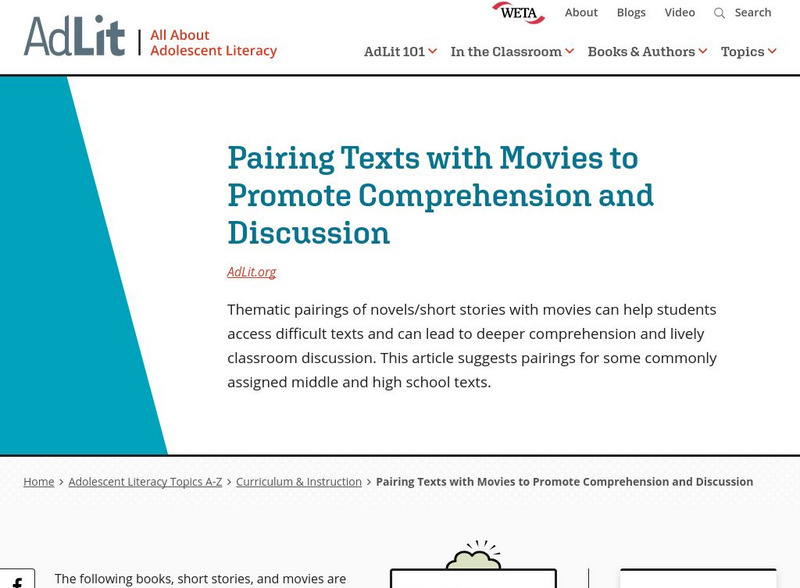Online Writing Lab at Purdue University
Purdue University Owl: Organizing Your Argument
This Purdue University OWL (Online Writing Lab) explains how to organize information in an argumentative essay. Several examples are provided to show how each piece of evidence is elaborated.
Better Lesson
Better Lesson: Analyzing Text Complexity of Non Fiction Sources
This lesson will help students read and comprehend nonfiction, specifically biographies, through determining criteria for text complexity. Included is a PDF and Smart Notebook titled Determining Text Complexity, and an example of a...
Better Lesson
Better Lesson: Collaborative Booktalk: Sharing and Writing Development
Are dark themes in young adult novels harmful or helpful to teens? Students will explore this question and will create an argumentative writing piece based on textual evidence. Videos of the lesson in action, examples of student work,...
Texas Education Agency
Texas Gateway: Analyze Texts With Similar/different Purposes
[Accessible by TX Educators. Free Registration/Login Required] This lesson is about being able to identify the author's purpose in a specific text. Specifically, it's about looking at several authors' works on the same topic and...
Other
Curriculum Associates: Comparing and Contrasting Texts [Pdf]
In these activities, students are asked to compare and contrast two versions of each event with two pieces of writing that are about the same topic. Teaching notes with answer keys are provided as well.
Texas Education Agency
Texas Gateway: Write Expository Text That Synthesizes Ideas
[Accessible by TX Educators. Free Registration/Login Required] A learning module that teaches students how to bring ideas together in an expository text in four lessons: Introduction, Analyzing Our Sources, Pulling Out the Major Points...
BBC
Bbc Bitesize Revision: Discursive (Analytical) Writing
Short tutorial about discursive, or analytical, writing from a Scottish Standard Grade examination preparation site. Contains seven pages of information about the following: organising, essay examples, finding information, planning,...
AdLit
Ad lit.org: Extended Discussion of Text Meaning and Interpretation
Teachers should provide opportunities for students to engage in high-quality discussions of the meaning and interpretation of texts in various content areas as one important way to improve their reading comprehension.
AdLit
Ad lit.org: Using Multiple Texts to Teach Content
Each of us, every day, has to contend with multiple messages or texts-in the news, over the Internet, in our workplace, in books, and in conversation. Making sense of these sometimes conflicting messages is critical. But without being...
AdLit
Ad lit.org: Content Area Literacy: Mathematics
Of all the academic disciplines taught in middle and high school, the one we least expect to entail reading extended texts is in mathematics, but math texts present special literacy problems and challenges for young readers.
Curated OER
Mc Graw Hill: Use Details and Examples
Review how to use text evidence, details, examples, and personal experiences to make inferences then read a passage to practice on your own.
Polk Brothers Foundation Center for Urban Education at DePaul University
De Paul University: Center for Urban Education: Classify and Summarize Information [Pdf]
This learning module contains a link to graphic organizers that will help students categorize content and comprehend short and extended texts. The graphic organizers are designed to be applied to reading nonfiction passages in science...
Other
Interacting Texts Directed Activities Related to Texts (Darts)
Want to improve your students' reading skills? This is a good place to find the types of directed activities, using a definition text, reconstruction/analysis activities, and advantages of using DARTs.
ReadWriteThink
Read Write Think: Get the Gist: A Summarizing Strategy for Any Content Area
A five-part standards-based lesson in which students learn to write a 20 word summary of an informational text by focusing on answering the questions who, what, when, where, why, and how. This strategy can be applied to any content area,...
ReadWriteThink
Read Write Think: Reading and Analyzing Multigenre Texts
This lesson plan deals with the process of analyzing a variety of literary texts from poetry and letters to diary entries and works of fiction. Included in the lesson plan is an overview, practice, objectives, resources, preparation, and...
Grammarly
Grammarly Handbook: Evidence
This page focuses on the evidence to support points in an essay. Be sure you have enough support for each point and that the points are strong ones. It also suggests you double check both direct and indirect quotations in your paper to...
Other
English Companion: Reading Expository Text
Taken from "Reading Reminders: Tools, Tips, and Techmiques," the information on this website provides advice on how to read, understand, analyze, and write expository texts.
Polk Brothers Foundation Center for Urban Education at DePaul University
De Paul University: Center for Urban Education: I Can Classify and Infer When I Read [Pdf]
This site contains links to two graphic organizers to guide and assess the understanding of nonfiction text in science and social studies.
Capital Community College Foundation
Guide to Grammar and Writing: Developing a Definition
Not sure what a definition paper is? This is a great site from the Capital Community College to help you with developing a definition. Includes a sample essay and guiding questions.
E Reading Worksheets
E Reading Worksheets: Fact and Opinion Lessons
In this learning module, students will learn more about the differences between facts and opinions. A PowerPoint presentation and related activity are provided to reinforce the topic of facts vs. opinions. This module is designed to...
Other
Mo Dept. Of Ed.: Writing Essays (Expository) (Lesson)
Lesson plan designed for seventh graders. Students write expository essays that include details, facts, and examples. Includes prewriting handouts, some example paragraphs, some example prompts, and a scoring guide.
AdLit
Ad lit.org: What's the Big Idea? Integrating Young Adult Literature
Drawing on New York City teachers' experiences, this article examines three ways to effectively integrate young adult literature into the curriculum: use core texts (usually novels, but also other genres as well) that the entire class...
AdLit
Ad lit.org: Pairing Texts With Movies to Promote Comprehension and Discussion
Thematic pairings of novels/short stories with movies can help students access difficult texts and can lead to deeper comprehension and lively classroom discussion. This article suggests pairings for some commonly assigned middle and...
Varsity Tutors
Varsity Tutors: Web English Teacher: Expository Writing
This Web English Teacher provides great links and resources for assistance, activities, and information about expository writing.


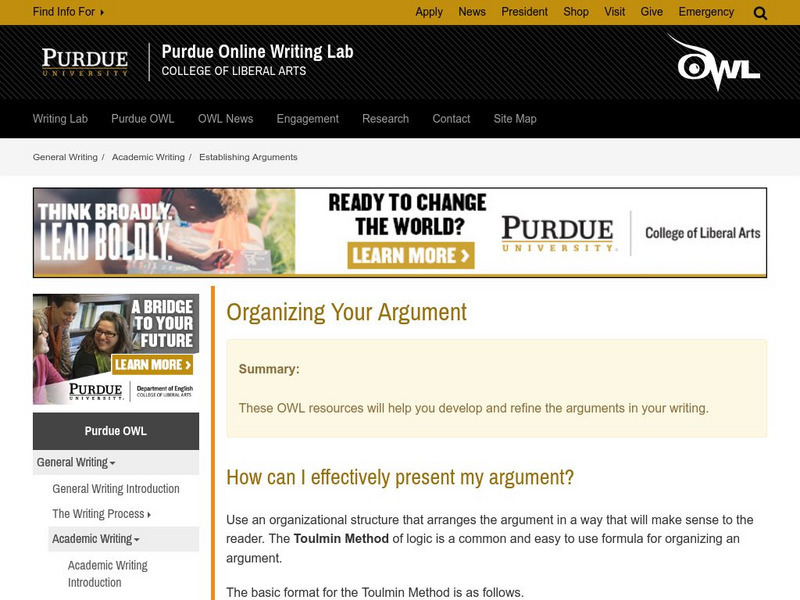

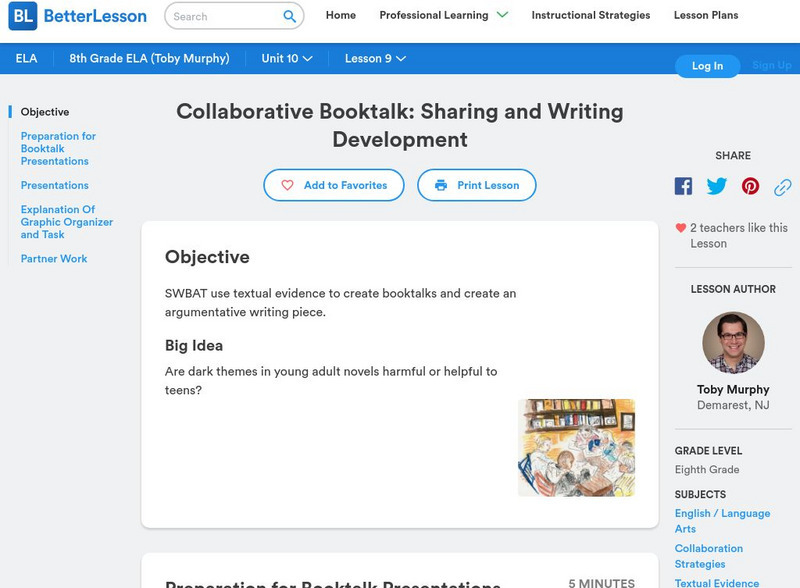

![Curriculum Associates: Comparing and Contrasting Texts [Pdf] Lesson Plan Curriculum Associates: Comparing and Contrasting Texts [Pdf] Lesson Plan](https://d15y2dacu3jp90.cloudfront.net/images/attachment_defaults/resource/large/FPO-knovation.png)



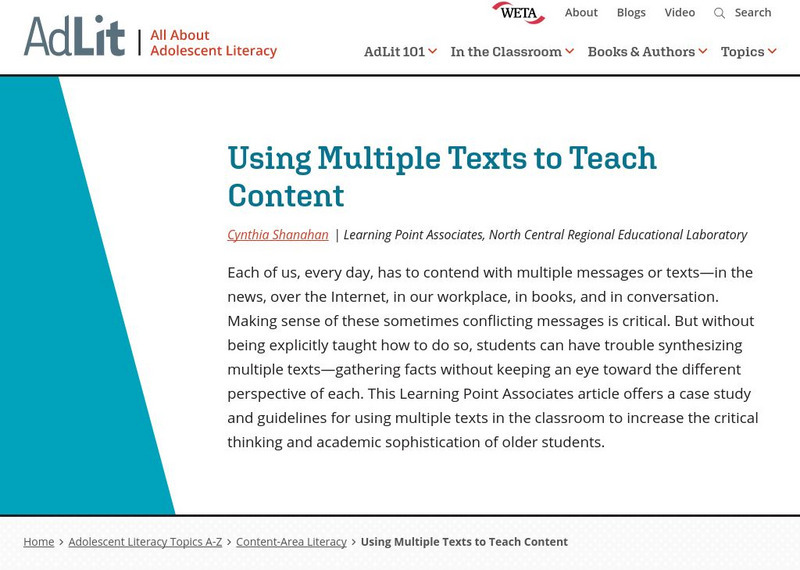
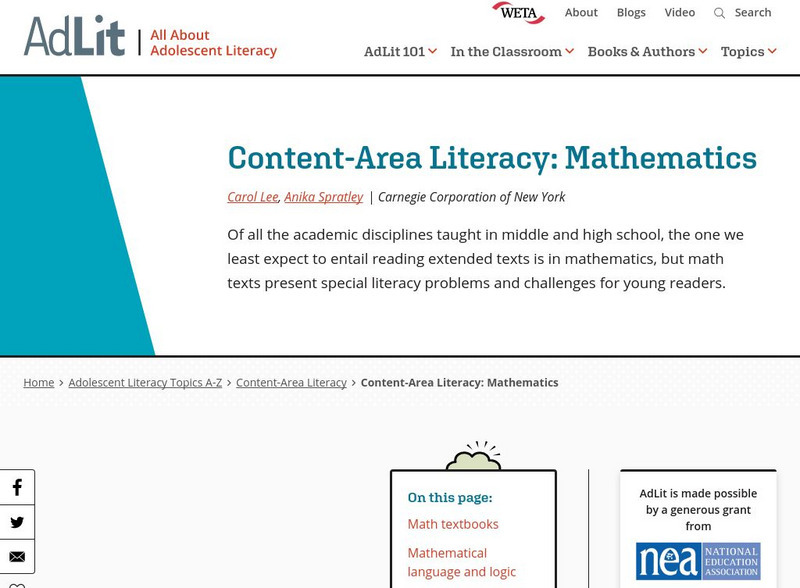
![De Paul University: Center for Urban Education: Classify and Summarize Information [Pdf] Unit Plan De Paul University: Center for Urban Education: Classify and Summarize Information [Pdf] Unit Plan](https://content.lessonplanet.com/knovation/original/78057-7ba90e0b8b82fde8e26d306a4af31f79.jpg?1661787062)

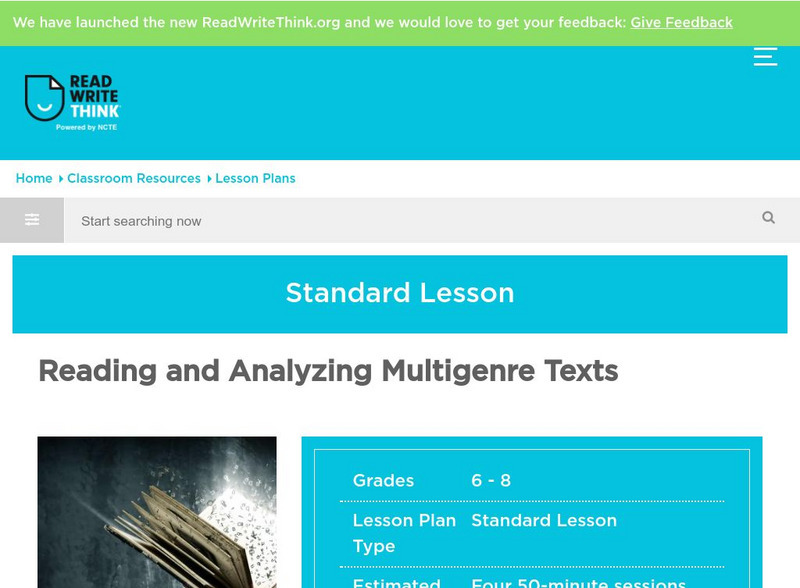

![De Paul University: Center for Urban Education: I Can Classify and Infer When I Read [Pdf] Unit Plan De Paul University: Center for Urban Education: I Can Classify and Infer When I Read [Pdf] Unit Plan](https://content.lessonplanet.com/knovation/original/119984-1e8c3bd778b0e773bd6dcdc545a348e7.jpg?1661787061)



